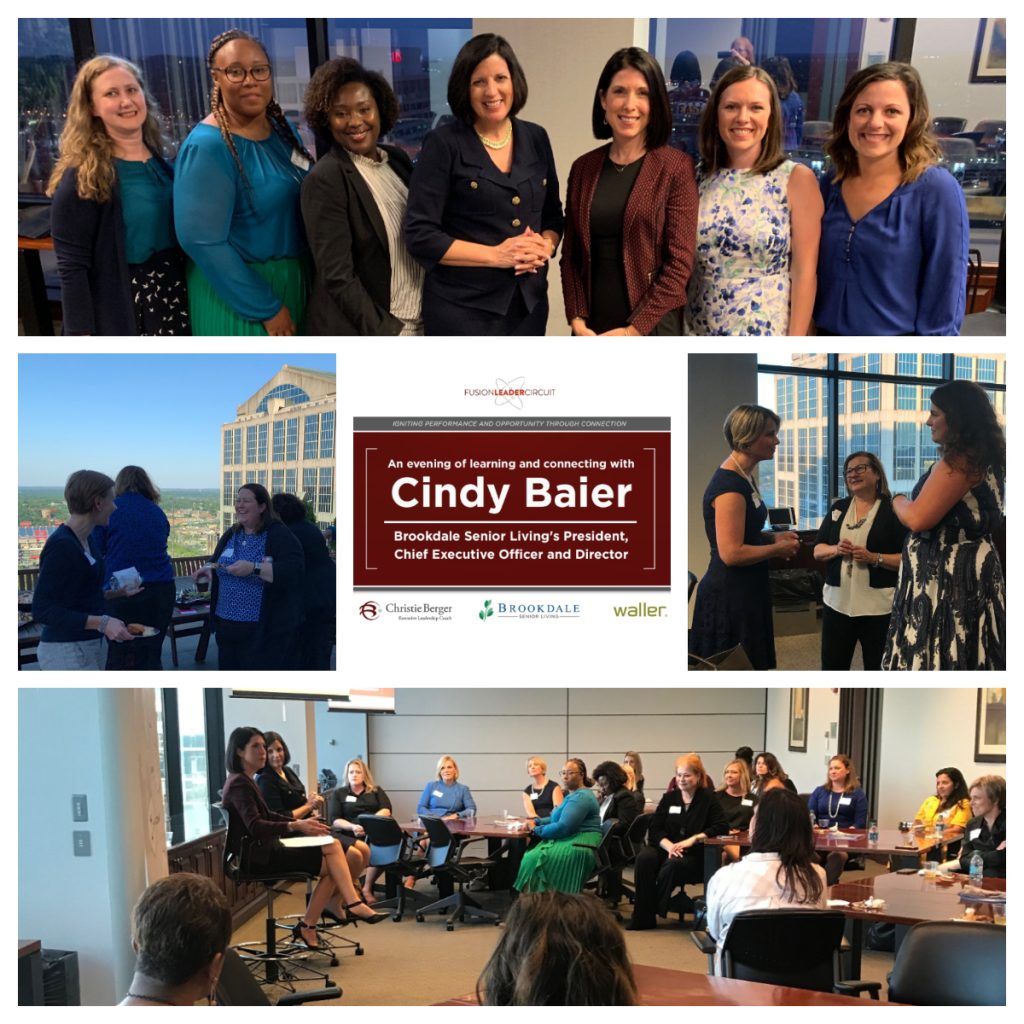INSIGHTS
NEVER MISS AN UPDATE
Sign Up for Monthly Episodes and Insights
SUBSCRIBE TO NEWSLETTER

The article below was published by Nashville Voyager's "Most Inspiring Stories" series. View the original article here . Today we’d like to introduce you to Christie Berger. Hi Christie, thanks for sharing your story with us. To start, maybe you can tell our readers some of your backstory. As a seemingly successful twenty-something, I was in a national sales manager role within a large corporation and had checked all the boxes of “success” – money, benefits, work travel, etc. Yet, I realized that I was not fulfilled in the work I was doing. Therefore, I decided to quit my secure job and take the necessary steps to start my own executive coaching business. Yes, even when coaching was still fairly new, and most coaches were retired executives or “more seasoned” professionals. In the very beginning, I sought out advice from a variety of well-intentioned people already in the industry. Good thing I didn’t actually take much of it! Many people thought that I was too young and needed more experience (or more of this or that). That said, what I did take away, early on, were two concepts that I hold onto to this day: • To not compare your beginning to someone else middle or end – you will always come up short and hold yourself back • To not limit yourself based on others limited views of what is possible Gratefully, I relied on the persistence and resilience that I had developed early in life to navigate the sometimes-rocky terrain of starting a new business. Because I was younger with limited experience and connections, I had to be strategic and creative to build up my credibility and brand. I sought out partnerships, such as being the Head of Executive Coaching for the business school of Belmont University, short-term consulting projects in learning and development and even a weekly live radio show to help stretch and build up my skillsets. More importantly, I invested in myself by seeking out learning opportunities and certifications that would allow me to best serve my clients. I constantly pushed myself out of my comfort zone which is how we learn and grow (a foundational premise of the work I do as an executive coach). I would be remiss not to reference that I am also a working parent. The question that still comes up: Can you have it all? I say yes, it just looks different everyday. Some days are a little more full or chaotic than others (recent example—I started the day with that little one chasing me out the door and into the driveway crying hysterically, then transitioned and spent the next 8-9 hours getting to coach and interact with 26 leaders representing 12 different Nashville organizations then wrapped up the day with parent-teacher conferences and the nightly routine), while other days run like a well-oiled machine with everyone feeling great. Yet, at the end of each day regardless of how they play out, I am always thankful that I took the risks, followed my heart and I now get the privilege to work with some of the most amazing leaders and innovative organizations in Nashville and beyond. My ultimate professional purpose is to make a difference by helping those I work with to enhance their performance and view of what is possible…. and for now, coaching of leaders and teams is my conduit for doing so. I am excited to see what the future holds. Alright, so let’s dig a little deeper into the story – has it been an easy path overall and if not, what were the challenges you’ve had to overcome? As a young person that overcame difficult circumstances, including being “on my own” since my junior year of high school, the difficulties of building a successful business or coaching practice seem minor. That said, the challenges of being an entrepreneur can be monumental. There were times that it would have been easier to give up and take a more secure internal role within an organization. I always knew that patience and persistence would pay off. I purposely took the long view by taking on projects or partnerships that would help build my credibility and that aligned with my purpose. In doing so, I was able to 1) add value and 2) build relationships. In my industry (and in most industries), your relationships and network are the conduit to future opportunity. Since I struggled early in my business on building the critical relational network needed to grow my practice, I vowed that once I was in a position of influence, I would be an intentional catalyst to bring people together. Today, I am purposeful with connecting people professionally with an emphasis on women leaders. This is a foundational premise of the Fusion program I run annually for Nashville-based women leaders. I truly believe that opportunity and growth derive from our connections…and hard work. Appreciate you sharing that. What else should we know about what you do? I consider myself a catalyst that helps organizations accelerate its performance by developing great leaders. As an executive leadership coach, I partner with organizations to work closely with their key leaders in an effort to make them more effective within their respective roles. This can be done in a 1:1 or small group format. I specialize in working with mid to senior-level executives. I choose to work with great companies that value their people and strive to build great cultures in order to meet their strategic objectives. Through my work, I also identified a strong need to support women leaders in a different way. After benchmarking other women initiatives in the Nashville area, I built and launched Fusion in 2016, a 12-month executive development program for women. The program is in its fifth year serving women leaders from over 25 Nashville area organizations. Fusion ignites learning through neutral forums connecting women leaders across industries and communities. Through group coaching sessions, private speaker sessions and community events, participants strengthen their networks; which are the conduits to opportunities, resources, learning and heightened performance. This is a program I am very proud of, in addition to my coaching practice of over 13 years and my new podcast, Leading Forward with Christie Berger. In terms of your work and the industry, what are some of the changes you are expecting to see over the next five to ten years? The professional coaching and development industry is continuing to evolve. A trend that I see for coaching in particular is that it is becoming more accessible for individuals and leaders earlier in their careers. There are a few reasons for this. • Rapid Pace of Change – Leaders at all levels are required to adapt at a much faster rate. Organizations are realizing that they need to equip their people with the ability and mindset to seek out and embrace new ways of working on a continuous basis. • Technology – There are more platforms and tools that allow coaching professionals to “reach and support” more people. • Individual Development Ownership – As the working norms shift, more people are taking ownership of their own development and career paths. This leads people to reach out directly for coaching support rather than solely depending on their organizations to provide a coaching resource. As the business environment and working norms continue to evolve, so will the professional coaching and development industry. In coaching, we say “we meet the client where they are”. I think at the macro level the coaching industry will adjust to meet the collective needs of the organizations and leaders that they serve.

Letting Go and Delegation The theme that emerged in my coaching practice this past month had me replaying the very popular Disney song, “ Let It Go ” over and over in my head. As many organizations are in the midst of significant changes, many leaders are struggling with what to hold onto and what to let go of - figuratively and literally. The struggle to delegate has often been a challenge for leaders during times of change and transition, especially when moving into higher levels of leadership. Now it seems the stakes are higher, and the spotlight is brighter to get things “right.” With all of this pressure, albeit some self-imposed, many leaders are falling back on old habits of, “I will just take care of it myself.” Their motives for this approach may fall on the spectrum of being altruistic (I want to protect my overworked team) to self-serving (I want to ensure it is “correct”). For others, the current climate of leaner teams and increased workload is just revealing that some leaders have not been that proficient in delegating all along. If you are finding yourself impulsively rolling up your sleeves, having no one to delegate to or on the edge of burnout more often these days, you may want to reevaluate your relationship with delegation. A few questions to consider: Am I truly leading at my level and doing only what I can do in the role I am in? What does my calendar say about my ability to delegate? What assumptions am I making about my team’s capacity and capabilities? What is my understanding of HOW to effectively delegate? How is NOT delegating effectively impacting my team and the perception of my ability to lead? Remember, letting go and delegating effectively allows you to lead at the highest level of your skills and abilities, and it also provides other colleagues the opportunity to engage, grow and develop their own capabilities. Ultimately, a cornerstone and outcome of successful leadership. Until next time, Christie

Running on Empty | Issue No. 2 Tired, fatigued, uncomfortable, tired, overwhelmed, eager and tired. These were the opening check-in words given at the beginning of a global leadership team coaching session last week. Even as we try to bask in the finite energy of hope and optimism that a new year often brings, many leaders are faced with the realization that they and their teams are running on empty. In that same session, the team explored the tension points between the current reality, of both internal and external constraints, and the charge they have been given to execute an aggressive growth strategy. As you can imagine, and are possibly experiencing, the path forward is not clear and relying on past experiences alone will not be enough to reveal a solution for this moment in time. What is clear, is that prioritizing time together as a team to candidly discuss the present and future will yield, at minimum, two outcomes: New and unexpected paths forward An increase in connectivity and alignment amongst the team With that in mind, I leave you with a few questions to consider: How are you prioritizing consistent time with your teams (the one you are a part of, your first team, and the one that you lead)? What are you doing to cultivate the psychological safety necessary for candid conversations to occur within your teams? Until next time, Christie







